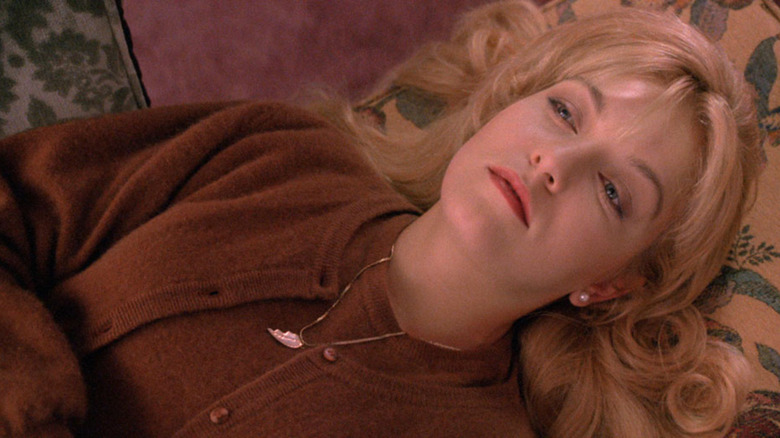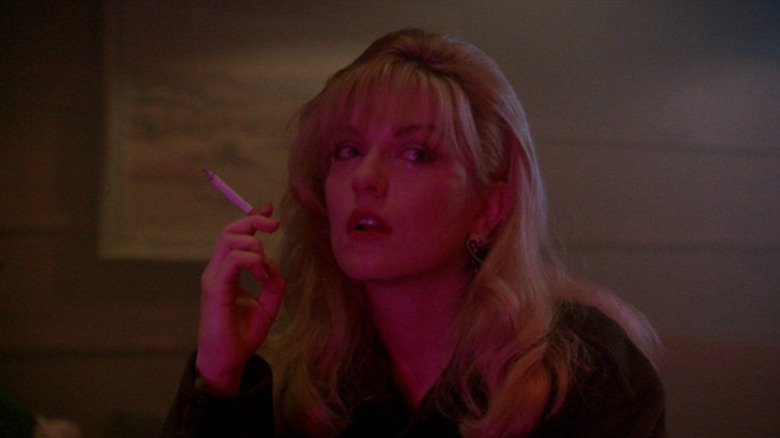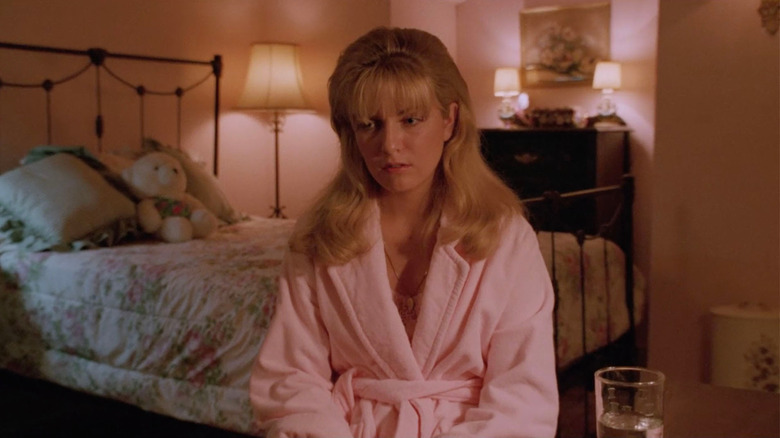With Twin Peaks: Fire Walk With Me, David Lynch Dismantled The American Dream Through The Eyes Of Laura Palmer
David Lynch is a director who has always, in a way, been ahead of the curve. His vision throughout both his film and television projects is uncompromising, and even those that had received mixed reception during their release are often warmly regarded today (at least by Lynch fans).
Perhaps the most drastically re-evaluated Lynch film is "Twin Peaks: Fire Walk With Me." The prequel film to his and Mark Frost's seminal series "Twin Peaks" was a critical and commercial flop upon release, with many criticizing its drastic tonal shift and bizarre imagery. What many people didn't realize at the time, however, is that "Fire Walk With Me" was perhaps the best example of Lynch's creative influences in action. The crumbling American Dream, the dissolution of the nuclear family, and the overall absurdity of societal pressures all play integral parts in this prequel.
There is no other character that embodies these terrors than Laura Palmer (Sheryl Lee), who is given the spotlight in "Fire Walk With Me." While her death is the most critical aspect of "Twin Peaks," there were only hints of her character's true symbolism throughout the series. However, her thematic importance is at the center of this prequel, cementing her as the encapsulation of everything Lynch strives to critique and the perfect symbol for all of his creative work.
And the angels won't help you
While a prominent part of "Twin Peaks," there wasn't a lot that could be said about Laura. At the time, this was by design, as her death was the catalyst for even darker secrets to emerge. Gradually, the show revealed that she wasn't the person she seemed, actually being consumed by something she couldn't control. However, this shouldn't be the case. On the surface, she seems like the typical '90s high-schooler; she's got a nice house, her best friend named Donna (Moira Kelly, who replaced Lara Flynn Boyle for this film), and a boyfriend in Bobby (Dana Ashbrook). If she's following all of the tenants of being a good American girl, then why is she unhappy?
That's because the girl-next-door attitude she carries is just a facade. Her life is crumbling, particularly the increasingly volatile relationship she has with her father, Leland (Ray Wise). In all actuality, Laura feels like something is deeply wrong, although she doesn't know what. She tries to hide these strange feelings through underage sex work, cocaine, and cheating. This is explained in the film as the tightening grip of BOB's (Frank Silva) presence, with the decay of this facade she's built up symbolizing the increasing pressure of being the ideal daughter. As long as she has this burden, one both self-inflicted and forced upon her, Laura will always be destined for a horrible fate. This is where she truly fits in Lynch's creative puzzle.
There is no Lynch without Laura
Laura was initially the embodiment of the girl next door, a perfect teenage girl in a successful family that was friends with everyone. She was all of that and more for the citizens of Twin Peaks, which made her death that much more tragic. However, this was all a dream — a carefully constructed illusion. The real Laura Palmer was miserable and dreamt of being someone entirely different, someone not being crushed by social pressure. These expectations and caricatures of happiness are also what Lynch has skewered throughout his career.
All of his work can coincide with ideal American living and values. Having grown up in 1950s Middle America, the prime example of the ideal American life, his explorations of the depressive and restrictive nature of these constructs are always fascinating to watch. These same ideas were frequently touched upon in "Twin Peaks," but in a more tongue-in-cheek and satirical way. Perhaps this is why "Fire Walk With Me" was so maligned when it was first released; maybe fans did not want to admit that the darkly comic idealism the show provided was all a sham.
However, it did exactly that. By focusing on those last seven days of Laura Palmer's life and how she met her end thanks to the horrifying realities of American idealism, "Twin Peaks: Fire Walk With Me" solidified David Lynch as one of the best directors to demystify the American Dream. It is not freeing or relieving, but rather is a purgatorial death sentence.


